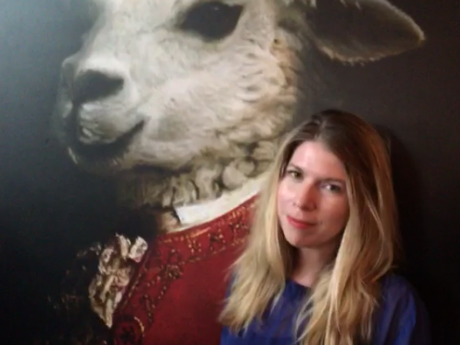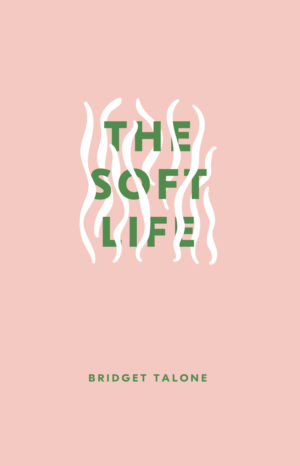In Their Own Words
Bridget Talone on “Emotional Lady”

Emotional Lady
A hymn to a virgin and a martyr.
I said I thought it sounded like a nail polish color.
A dripping honeycomb in the face of completion.
Some days are like a magazine.
Some fucking feels involuntary.
I too was folded into these wars like startled pauses
—the one beginning, the one between, the one
pushing shapes from back behind the draperies.
Didn't you always want to know everything?
The sex of the sea is a high violet yes
like an evil laugh: disarming.
You think you had a lot of feelings? He had
a lot of feelings. This one is a sunburn.
This one, more a sigh. He had feelings
for the daughter of his protégé who married
someone else. I pressed them all to me and
made me blurry. Sobbing weeping fruit. Cut in half,
a little death's apprentice. One half little
perfect. One half perfect-little-head popped off.
From The Soft Life (Wonder, 2018). All rights reserved. Reprinted with the permission of the author.
On "Emotional Lady"
I was able to find the energy of "Emotional Lady" through a collage-like process of ordering and reordering different fragments of language and seeing how they interacted and moved as a whole. The language came from scrapped essays and poem drafts and notes in my journal, as well as from things I overheard. The title, and the lines A hymn to virgin and a martyr, and He had feelings for the daughter of his protégé who married someone else were transcribed from the classical music station I sometimes listen to when I write at home. It was fun to arrange and attend to the surface of the poem, while feeling primarily engaged as that poem's reader.
Because the writing has to do with negotiating a female identity, I wanted the poem to reproduce the feeling of disorientation that comes with having your experience of reality overwritten. How, in encounters with the overwriter—whoever that may be—you're not able to predict what comes next, you're in a chaotic, moment-to-moment battle for the power of inscription. As much as possible, I wanted to have those be the terms of apprehension for the reader. I hoped the poem could track an intelligence taking shape under those circumstances. I'm interested in the ways intelligences develop through perceiving the systems and conditions they're a part of. And I like to think reading can be a place to practice feeling and assessing the worlds in which we live.
As appealing as it can be to surrender to a work that moves with perfect confidence, I didn't want this poem to overlook the pleasures of uncertainty. It can be bracing to find yourself in a situation where nothing has settled into place, so you can't settle either. It seems to me that's when, for better or worse, things come closer.
In "Emotional Lady," that closeness is primarily registered through the body. New information and experiences change the bodies that meet them—making them blurry or headless, or temporarily hidden and pushing at whatever is nearby to make a record of their presence. This push and pull of effacement and agency matters to me. Though the narrating voice in "Emotional Lady" has at least the power of its narration, the end of the poem (from You think you had a lot of feelings? He had /a lot of feelings… on) moves through the process of giving up agency to serve a power you've been told is in your interest to serve. I sometimes wonder how other people recognize or make sense of these dynamics, and if recognition and sense making might enable a change away from them.
I don't think I'm suggesting that this poem itself is changing anything, but I do like the way it moves (fast, to shake off someone's grasp). As I was writing the poem, I thought of a game I used to play with kids at school, popping the tops off of dandelions with our thumbs, singing Mama had a baby and her head popped off. It seemed to echo this trio of pictures of halved fruits and vegetables I saw pasted up at a deli in my neighborhood. It was a carrot, an apple and an orange, each streaming juice from its core, with no evidence of pressure. They looked to me like saints going through some miraculous act. I felt like I could end the poem because I had found my way back to the unnamed saint from the first line, and at the same time, into some expressions of ejecting internalized pressures—the violence of children's songs, or weeping out something inside of you.



